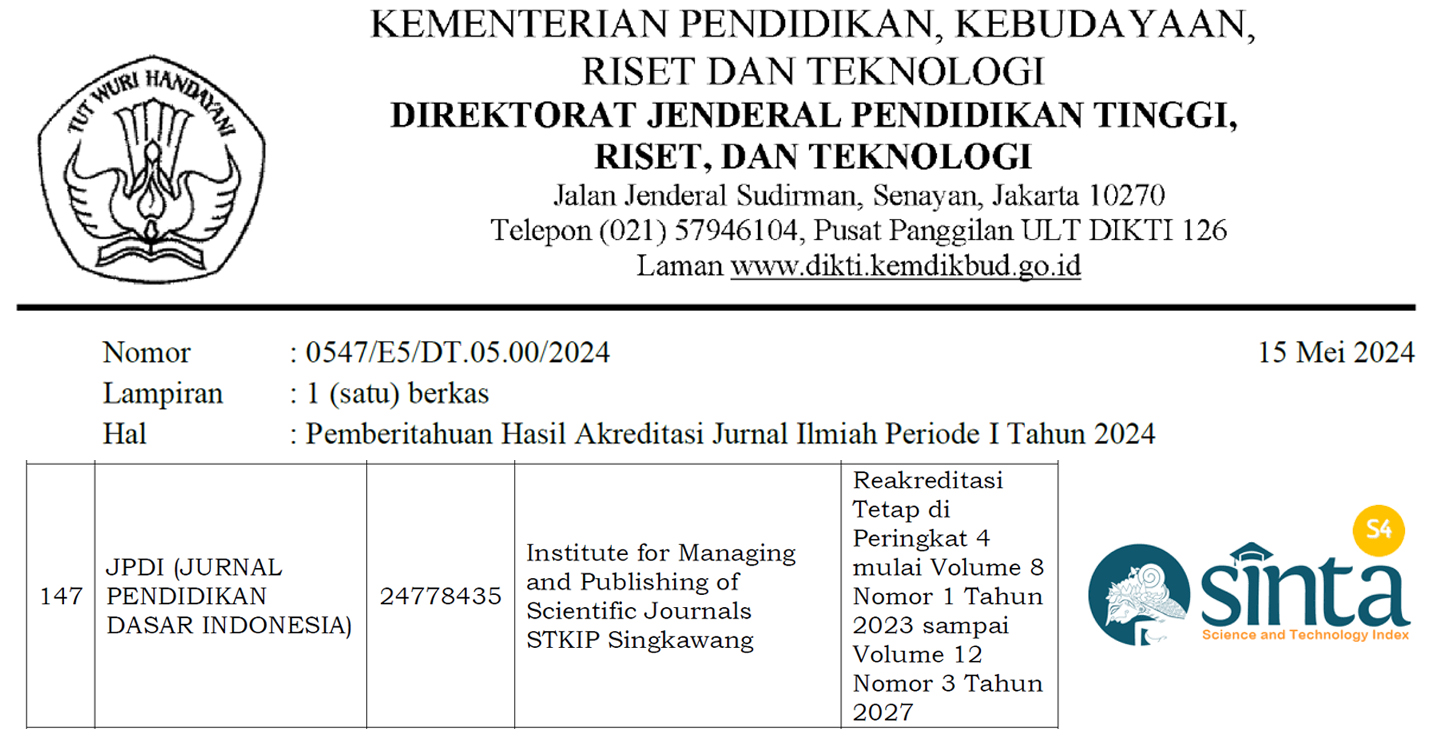Kompetensi Teknologi, Pedagogi, dan Konten Guru SD Negeri dan Swasta di Kota Cimahi, Jawa Barat
Abstract
Guru SD dituntut untuk memiliki pengetahuan konten (content) mata pelajaran, pengetahuan pedagogi (pedagogy), dan pengetahuan teknologi (technology) dalam bentuk pengetahuan yang integratif dalam pengelolaan pembelajaran. Penelitian ini bertujuan melihat dan menganalisis faktor-faktor apa saja yang paling dominan dalam membentuk kompetensi guru tersebut dalam aspek pengetahuan konten, pengetahuan pedagogi dan pengetahuan teknologi yang pada gilirannya dapat mengembangkan model pengembangan Technological Pedagogical and Content Knowledge (TPACK) yang sesuai untuk guru SD. Penelitian ini dirancang menggunakan pendekatan kuantitatif, dengan metode deskriptif dan verifikasi. Data dianalisis menggunakan statistik deskriptif dan analisis faktor konfirmatori (CFA) berdasarkan Partial Least Square (PLS). Hasil penelitian menunjukan bahwa faktor-faktor yang pengaruhnya paling dominan adalah pedagogical knowledge (0,944), technological content knowledge (0,942), dan technological pedagogical knowledge (0,935). Sedangkan, pedagogical content knowledge, content knowledge, dan technological knowledge tidak sepenuhnya membentuk TPACK guru SD tersebut.
Keywords
Full Text:
PDFReferences
Ball, S. J. (2009). Privatising education, privatising education policy, privatising educational research: Network governance and the ‘competition state’. Journal of education policy, 24(1), 83-99.
Buckner, E. S. (2017). The changing discourse on higher education and the nation-state, 1960–2010. Higher Education, 74(3), 473-489.
Peraturan Menteri Pendidikan dan Kebudayaan Republik Indonesia Nomor 22 Tahun 2020 tentang Rencana Strategis Kementerian Pendidikan dan Kebudayaan Tahun 2020-2024.
Fadel, C., & Trilling, B. (2010). 21st Century Skills: Learning for Life in Our Times. Education Review.
Lee, C. S., Tan, D. T., & Goh, W. S. (2004). The next generation of e-learning: Strategies for media rich online teaching and engaged learning. International Journal of Distance Education Technologies (IJDET), 2(4), 1-17.
Griffin, P., & Care, E. (2014). Assessment and teaching of 21st century skills: Methods and approach. Springer.
Muilenburg, L., & Berge, Z. (2015). Revisiting teacher preparation. Quarterly Review of Distance Education Journal Issue, 16(2), 93-105.
Shulman, L. S. (1986). Those who understand: Knowledge growth in teaching. Educational researcher, 15(2), 4-14.
Angeli, C., & Valanides, N. (2009). Epistemological and methodological issues for the conceptualization, development, and assessment of ICT–TPCK: Advances in technological pedagogical content knowledge (TPCK). Computers & education, 52(1), 154-168.
Mishra, P., & Koehler, M. J. (2006). Technological pedagogical content knowledge: A framework for teacher knowledge. Teachers college record, 108(6), 1017-1054.
Harris, J., Mishra, P., & Koehler, M. (2009). Teachers’ technological pedagogical content knowledge and learning activity types: Curriculum-based technology integration reframed. Journal of research on technology in education, 41(4), 393-416.
Thomas, T., Herring, M., Redmond, P., & Smaldino, S. (2013). Leading change and innovation in teacher preparation: A blueprint for developing TPACK ready teacher candidates. TechTrends, 57(5), 55-63.
Avidov-Ungar, O., & Shamir-Inbal, T. (2017). ICT coordinators'tpack-based leadership knowledge in their roles as agents of change. Journal of information technology education, 16(1).
Graziano, K. J., Herring, M. C., Carpenter, J. P., Smaldino, S., & Finsness, E. S. (2017). A TPACK diagnostic tool for teacher education leaders. TechTrends, 61(4), 372-379.
Jang, S.-J., & Chen, K.-C. (2010). From PCK to TPACK: Developing a transformative model for pre-service science teachers. Journal of Science Education and Technology, 19(6), 553-564.
Koehler, M., & Mishra, P. (2009). What is technological pedagogical content knowledge (TPACK)? Contemporary issues in technology and teacher education, 9(1), 60-70.
Wahyudi, A., Liliasari, T. Supriyanti, & Nahadi. (2019). The development and validation of critical and creative thinking test in enzyme for undergraduate chemistry course. Unnes science education journal. 8 (1), 76-83
Perdana, R., Yani, R., Jumadi, J., Rosana, D. (2019). ssessing students’ digital literacy in senior high school. Jurnal Pendidikan Indonesia. 8 (2), 169-177.
Wahyudi, A. (2020). Profil keterampilan berpikir kritis dan kreatif calon guru kimia. Jurnal orbital. 4 (2), 99-110.
DOI: http://dx.doi.org/10.26737/jpdi.v6i1.2222
Refbacks
- There are currently no refbacks.

This work is licensed under a Creative Commons Attribution-NonCommercial 4.0 International License.
Published by:
Institute of Managing and Publishing of Scientific Journals, STKIP Singkawang
Address : STKIP Singkawang, Jalan STKIP - Kelurahan Naram Singkawang, Kalimantan Barat, INDONESIA, 79251
No. Telp. : +62562 420 0344
No. Fax. : +62562 420 0584
JPDI (Jurnal Pendidikan Dasar Indonesia)
e-ISSN : 2477-8435
p-ISSN : 2477-5940

Editor in Chief Contact: [email protected] / [email protected] / Wa: +6281345376986
Publisher Contact: [email protected] / [email protected] / Wa: +6282142072788
Management Tools
JPDI indexed by:
JPDI (Jurnal Pendidikan Dasar Indonesia) is licensed under a Creative Commons Attribution-NonCommercial 4.0 International License.









